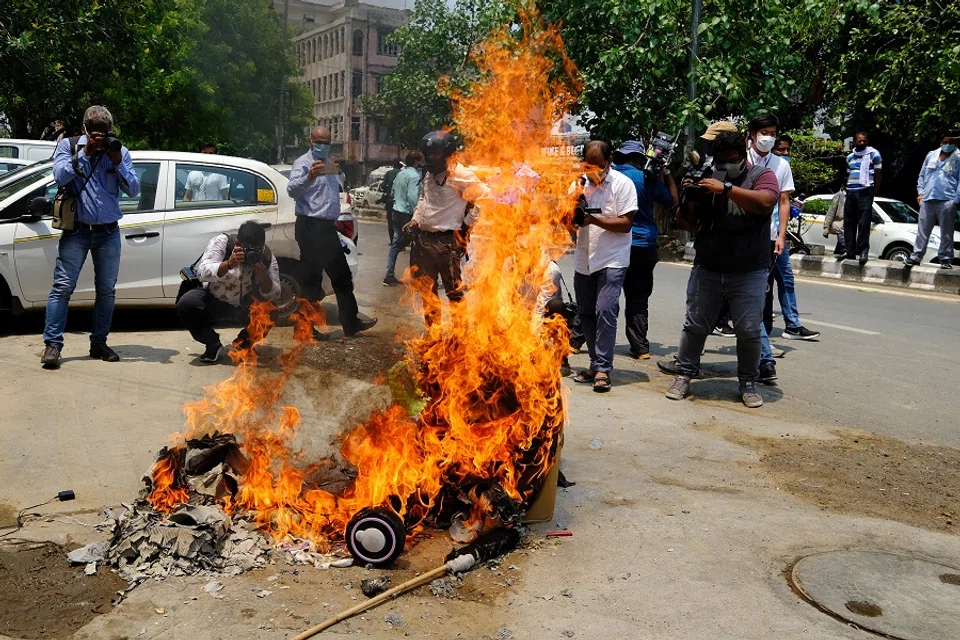Could fallout from China-India standoff hurt China's global ambitions?
Indian Prime Minister Narendra Modi has deleted his account on Chinese microblogging site Sina Weibo as tensions between India and China continue to simmer over a border conflict. While the skirmish could be seen as the latest chapter in a long-running bilateral tussle, political commentator Zheng Hao suggests that the fallout from China-India conflict is enmeshed in a web of implications in the multilateral arena of global relations and cooperation. He examines the issue and concludes that the damage to China will be greater in this case.

On 15 June, violence broke out between troops from China and India in the Galwan Valley. Subsequently, on 22 June, senior Indian and Chinese military commanders reached a "mutual consensus to disengage" from all friction areas during an 11-hour meeting at the Line of Actual Control (LAC), preventing a recurrence of confrontation and physical conflict. On 24 June, the Working Mechanism for Consultation and Coordination on India-China Border Affairs (WMCC) held a video conference, reiterating the consensus and emphasising keeping the crisis under control and not allowing the situation to escalate.
...the damage to China is greater.
Despite these events, looking at the military deployments of China and India in the Galwan Valley and Pangong Lake and other areas, there is still a risk of confrontation or conflict between troops on both sides, and there is no resolution in sight.
These territorial disputes are the main reason that China and India cannot totally trust each other and work together. The borders between China and India remain unclear, and the so-called LAC is just a tacit agreement of regional governance that both sides should observe. Of course, tacit agreements can be broken sometimes.
The territorial disputes between China and India have slowly diminished and eroded bilateral relations, while the fallout also threatens multilateral mechanisms where both are members. Of the two, the damage to China is greater.
However, detractors felt that Russia strongly advocated making India an official SCO member because of strong Russia-India military relations, and the thinking that India-China disagreements would weaken China's ability to lead the SCO.

China-India spat spills over to multilateral fora
Shanghai Cooperation Organisation
First, what China is worried about is happening with the Shanghai Cooperation Organisation (SCO). In 2017, the SCO expanded its membership for the first time, admitting former observers India and Pakistan as official members, to different views from Chinese academics.
Some academics felt that bringing in India and Pakistan would help to crack down on the three forces active in central Asia, Pakistan, and Afghanistan, and ease tensions between India and Pakistan over the Kashmir region. However, detractors felt that Russia strongly advocated making India an official SCO member because of strong Russia-India military relations, and the thinking that India-China disagreements would weaken China's ability to lead the SCO. Moscow's concern about China expanding its influence in Central Asia through the SCO might not happen then.
In fact, academics in China have long warned that once strategic relations between Russia and India and hostilities between India and Pakistan are brought into the SCO, it would affect the SCO's effectiveness and capabilities, and pose an enormous new challenge for China's leadership of the SCO.

It is common knowledge that India and Russia have long had a good cooperative relationship. Besides, in recent years, India has made great strides in its relationships with the US, Australia, and Japan.
The SCO is a multilateral organisation seeking to enhance regional economic and trade imperatives as well as advance counterterrorism initiatives. If it finds it difficult to build consensus and abide by the organisation's manifesto with a high level of mutual trust in terms of politics and security, how can it cooperate in the areas of security, the military, counterterrorism, and intelligence?
To some extent, bringing in India as a member has curtailed China's speaking rights in the SCO, and made it necessary for China to watch India's ties with other nations both within and outside of the SCO. For example, is it feasible for the SCO's plans and intelligence, and its assessments of regional and global politics and security, to still be kept within internal discussion among members? That is a valid concern.
Similarly, the long history of hostilities between India and Pakistan would make it more difficult for the SCO members to cooperate, and for the organisation to exercise its full capabilities.
For China and India, a real issue is their long-term trade imbalance. China has maintained a huge trade surplus, which stood at nearly $400 billion RMB in 2019.
BRICS
Second, the disagreements and conflicts between China and India make cooperation among the BRICS countries (Brazil, Russia, India, China and South Africa) a challenge. With the coronavirus situation still serious in India, Brazil, and Russia, these five rising economies are already finding it hard to maintain normal economic growth, while mutual trade, investments, and key projects have been hit hard.
For China and India, a real issue is their long-term trade imbalance. China has maintained a huge trade surplus, which stood at nearly $400 billion RMB in 2019. Additionally, a "boycott China" campaign has been sparked off in India due to the recent China-India border clash. Nationalist and a few anti-China forces have repeatedly pressured the Modi government to limit the import of Chinese goods. Old and new problems have added together and brought about unprecedented negative impacts to the cooperation between China, India, and the BRICS countries.

In late June, the International Monetary Fund released its World Economic Outlook report for 2020. The report predicted that China would be the only country in the BRICS to experience a 1% GDP growth this year, while other members would experience negative growths: -6.6% for Russia, -4.5% for India, -9.1% for Brazil, and -8.0% for South Africa.
Other than the pandemic, the political situations of the respective countries also determine if the BRICS can take the lead in resuming economic growth and propelling world economic recovery in the post-pandemic era. If China and India are unable to better their relations, it would be difficult for a broken BRICS to achieve anything. In the short term, the situation is clearly pessimistic.
RIC
Lastly, the China-India border conflict also affects the Russia, India, and China (RIC) foreign ministerial dialogue mechanism. The RIC dialogue mechanism originated in 2002 and is seen in the West as the three countries' intention to establish a mechanism similar to the regular meeting mechanism between the foreign and defence ministers of the US, Japan, and South Korea. On this basis, the RIC again caught the attention of the West when it held its first trilateral leaders' summit in 2006. The West had widely debated if these three fastest-growing economies of the world could shoulder the economic responsibility that the Group of Eight (G8) could not bear. (NB: The Group of Seven (G7) grouping of the world's advanced economies became the G8 when Russia joined in 1998, but returned to being the G7 when Russia was disinvited in 2014.)
This demonstrates a stark contrast between the "warm" Russia-India relations and "cold" China-India relations.
Clearly, this is too simple and impractical a thought. While China and Russia are comprehensive strategic partners, both countries have long openly declared that they are "partners" and not "allies". On the other hand, Russia and India have mutual needs that are especially clear in their rapid development of military cooperation in recent years. Last September, Russian President Vladimir Putin said that "India is one of the key partners of Russia", highlighting that the relationship between the two states is of a "strategic and special privileged nature".
It is known that the military-technical cooperation between Russia and India is an important part of the strategic cooperation between both countries. Both countries are striving towards the implementation of a military cooperation plan by the end of 2020, and carrying out joint ventures such as manufacturing Kalashnikov AK203 rifles, Ka-226T helicopters, and missile systems in India. Since last year, India has bought US$14.5 billion worth of weapons and military equipment from Russia, including S-400 surface-to-air missile systems, Talwar-class Project 11356 frigates, and so on. This demonstrates a stark contrast between the "warm" Russia-India relations and "cold" China-India relations.
However, as China and Pakistan are "all-weather friends", and India and Pakistan have hostile relations, it is unsurprising that a Russia-India versus China-Pakistan check-and-balance system is formed.

In terms of energy cooperation, Russia and India have also signed a five-year cooperative roadmap with each other, with Indian enterprises continuing their investments on four Russian oil and gas enterprises. At the same time, Russia has also agreed to increase its liquefied natural gas exports to India.
A problem between the two countries has the power to weaken three multilateral platforms.
Undoubtedly, Russia does not wish to see a further deterioration of China-India relations as this does not align with its fundamental interests. However, as China and Pakistan are "all-weather friends", and India and Pakistan have hostile relations, it is unsurprising that a Russia-India versus China-Pakistan system of checks and balances is formed. To a certain extent, the RIC dialogue mechanism is more focused on the three countries' communication and coordination on major regional issues - it is much more difficult for them to actually cooperate.
In conclusion, while this latest China-India border clash may seem like an isolated event, its repercussions are far-reaching. A problem between the two countries has the power to weaken three multilateral platforms. This then begs the serious question of how organisations such as the aforementioned SCO, BRICS and RIC - whose survival depend on both countries - can emerge unscathed if China and India are unable to resolve their territorial disputes.
Related: China and India say 'no' to Trump's offer to mediate border tensions | China-India border clash: Will India's misperceptions of China's strength lead to war? | China and India: When Western democracy fails and only utopia remains | India-China relations: Compromises and conflicts amid Covid-19



![[Photos] Fact versus fiction: The portrayal of WWII anti-Japanese martyrs in Taiwan](https://cassette.sphdigital.com.sg/image/thinkchina/3494f8bd481870f7c65b881fd21a3fd733f573f23232376e39c532a2c7593cbc)

